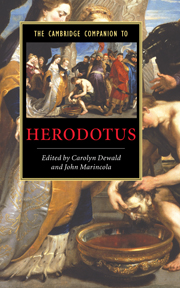Book contents
- Frontmatter
- Introduction
- 1 Herodotus and the poetry of the past
- 2 Herodotus and his prose predecessors
- 3 Herodotus and tragedy
- 4 The intellectual milieu of Herodotus
- 5 Meta-historiē: Method and genre in the Histories
- 6 The syntax of historiē: How Herodotus writes
- 7 Speech and narrative in the Histories
- 8 Herodotus, Sophocles and the woman who wanted her brother saved
- 9 Stories and storytelling in the Histories
- 10 Humour and danger in Herodotus
- 11 Location and dislocation in Herodotus
- 12 Herodotus and the natural world
- 13 Herodotus and Greek religion
- 14 Warfare in Herodotus
- 15 Herodotus, political history and political thought
- 16 Herodotus and the cities of mainland Greece
- 17 An alternate world: Herodotus and Italy
- 18 Herodotus and Persia
- 19 Herodotus and foreign lands
- 20 Herodotus' influence in antiquity
- Glossary
- Timeline
- Bibliography
- Index
- Series List
12 - Herodotus and the natural world
Published online by Cambridge University Press: 28 January 2007
- Frontmatter
- Introduction
- 1 Herodotus and the poetry of the past
- 2 Herodotus and his prose predecessors
- 3 Herodotus and tragedy
- 4 The intellectual milieu of Herodotus
- 5 Meta-historiē: Method and genre in the Histories
- 6 The syntax of historiē: How Herodotus writes
- 7 Speech and narrative in the Histories
- 8 Herodotus, Sophocles and the woman who wanted her brother saved
- 9 Stories and storytelling in the Histories
- 10 Humour and danger in Herodotus
- 11 Location and dislocation in Herodotus
- 12 Herodotus and the natural world
- 13 Herodotus and Greek religion
- 14 Warfare in Herodotus
- 15 Herodotus, political history and political thought
- 16 Herodotus and the cities of mainland Greece
- 17 An alternate world: Herodotus and Italy
- 18 Herodotus and Persia
- 19 Herodotus and foreign lands
- 20 Herodotus' influence in antiquity
- Glossary
- Timeline
- Bibliography
- Index
- Series List
Summary
Strepsiades: But you haven’t taught me anything about thunder.
Socrates: What? Haven’t you heard my theory – that the Clouds,
Dense when filled with water, make thunder when they clash together?
Strepsiades: Can you really believe that?
(Aristophanes, Clouds 382–5)Lear: First let me talk with this philosopher.
What is the cause of thunder?
(Shakespeare, King Lear)Herodotus set his story of the wars between Asia and Europe on the greatest of all possible stages, that of the entire earth. He understood, in a way that few Greeks of his day probably did, that the Persian empire was a national entity of unprecedented geographic scope and that the outcome of its wars against Greece had huge significance not just for human societies but for the earth as a whole. Thus his descriptions of distant lands, and even his biological and geographical inquiries, though often labelled 'digressions' by modern scholars and thus sidelined from the main narrative, are in fact very much a part of his artistic plan for his work. Persia was the first state in history that could plausibly assert the goal of making all lands one land, such that the sun would never shine on anything beyond its borders (7.8); indeed it succeeded, on two occasions, in uniting the continents of Europe and Asia by bridging the waters that stood between them - making all lands one in a geographic if not a political sense. This was world war in the truest sense: war threatening to change the world, including the world of nature.
- Type
- Chapter
- Information
- The Cambridge Companion to Herodotus , pp. 178 - 191Publisher: Cambridge University PressPrint publication year: 2006
- 8
- Cited by



